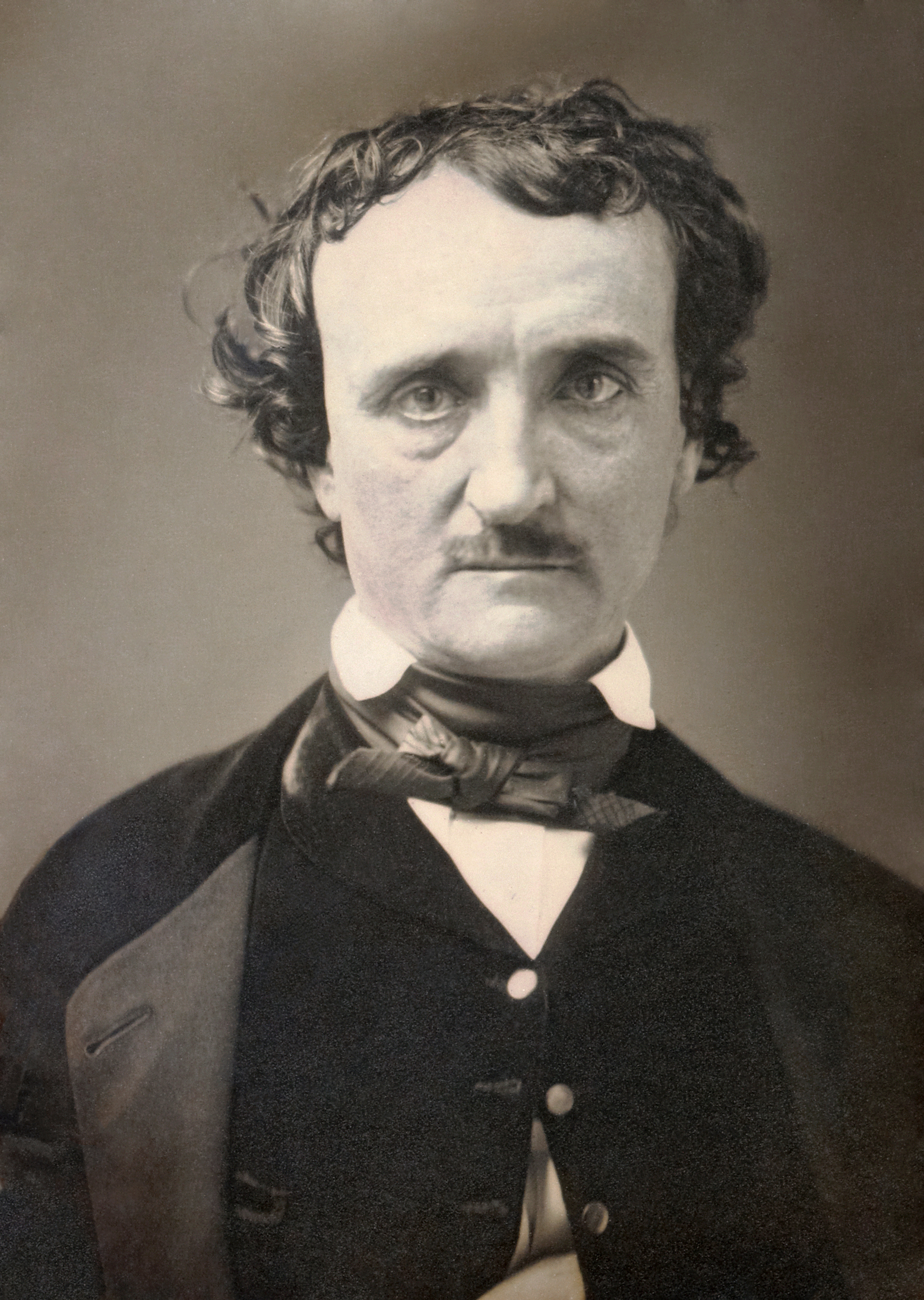„Nie w poznaniu jest szczęście, ale w poznawaniu.”
Not in knowledge is happiness, but in the acquisition of knowledge! (ang.)
Źródło: Potęga słowa
Edgar Allan Poe – amerykański poeta, nowelista, krytyk literacki i redaktor. Przedstawiciel romantyzmu w literaturze amerykańskiej. W jego twórczości dominowały wątki fantastyki i horroru. Zapoczątkował gatunek noweli kryminalnej . Stworzył także pierwszą w literaturze postać detektywa – C. Auguste’a Dupina.
Jego prozę charakteryzował silny psychologizm postaci oraz surrealistyczne, skrajnie brutalne opisy makabry, przywołujące na myśl stany epileptyczne czy upojenie alkoholowe. W twórczości Edgara Allana Poe odnaleźć można postawy choroby wieku – neurozy, świadomości dualizmu świata czy też bólu istnienia, które pod koniec XIX wieku stały się sztandarowymi pojęciami nowych nurtów sztuki: dekadentyzmu, ekspresjonizmu oraz symbolizmu.
Poe inspirował Baudelaire’a, Huysmansa, Dostojewskiego, Meyrinka, de Quinceya, Bierce'a, Lovecrafta, jak i całą rzeszę poetów surrealistycznych. Stephane Mallarme określił jego poemat Ulalume jako odbiegające od schematów swojej epoki arcydzieło poezji. Za jego przykładem szło wielu twórców, również polskich, np. Stefan Grabiński. Tadeusz Miciński wielokrotnie wspomina w swoich utworach inspirację fantastyczną wyobraźnią poety.
Zarówno poezję, jak i prozę Edgara Allana Poego tłumaczyło na polski wielu wybitnych literatów, jak np. Stanisław Wyrzykowski, Antoni Lange, Bolesław Leśmian, Tadeusz Miciński czy Zenon Przesmycki.
Twórczością Poego inspirowali się również filmowcy, tworząc mniej lub bardziej wierne ekranizacje jego opowiadań. Do najbardziej znanych dzieł filmowych należy nakręcony w latach 60. XX wieku cykl w reżyserii Rogera Cormana.
Mianem Edgarów nazywa się nagrody przyznawane przez organizację Mystery Writers of America.
Wikipedia

„Nie w poznaniu jest szczęście, ale w poznawaniu.”
Not in knowledge is happiness, but in the acquisition of knowledge! (ang.)
Źródło: Potęga słowa
Źródło: Ligeja, przeł. Stanisław Wyrzykowski
„Czas to pieniądz, a pieniądz to więcej niż czas.”
Time with me now, is money & money more than time. (ang.)
Men usually grow base by degrees. From me, in an instant, all virtue dropped bodily as a mantle. (ang.)
William Wilson
Źródło: Opowieści nadzwyczajne tom II, tłum. Bolesław Leśmian, wyd. Tow. Akc. S. Orgelbranda S-ów, 1913.
„Zawsze wierzyłem w głupców. Moi przyjaciele nazywają to wiarą w samego siebie.”
I have great faith in fools – self-confidence my friends will call it. (ang.)
Źródło: Marginalia w: The works of Edgar Allan Poe http://books.google.pl/books?id=an1KAAAAYAAJ, tom 3, Widdleton, 1849, s. 525.
„Ci, co śnią za dnia, wiedzą o wielu rzeczach niedostępnych dla tych, co śnią tylko nocą.”
They who dream by day are cognizant of many things which escape those who dream only by night. (ang.)
Źródło: Eleonora
„Jeśli chcesz od razu o czymś zapomnieć, zanotuj sobie, że to trzeba pamiętać.”
If you wish to forget anything on the spot, make a note that this thing is to be remembered. (ang.)
Źródło: Marginalia w: The works of Edgar Allan Poe http://books.google.pl/books?id=an1KAAAAYAAJ, tom 3, Widdleton, 1849, s. 483.
Quoth the Raven, „Nevermore!”
Inna wersja: Rzekł kruk na to: „Nigdy już!” (tłum. Zenon Przesmycki)
Źródło: Kruk, 1845
William Wilson
Źródło: Opowieści nadzwyczajne tom II, tłum. Bolesław Leśmian, wyd. Tow. Akc. S. Orgelbranda S-ów, 1913.
„Zazwyczaj ludzie podleją stopniowo.”
Źródło: Wielka księga mądrości, wybór Jacek i Tomasz Ilga
The Poetic Principle (1850)
Marginalia http://www.easylit.com/poe/comtext/prose/margin.shtml (November 1844)
The Poetic Principle (1850)
Kontekst: I hold that a long poem does not exist. I maintain that the phrase, "a long poem," is simply a flat contradiction in terms.
I need scarcely observe that a poem deserves its title only inasmuch as it excites, by elevating the soul. The value of the poem is in the ratio of this elevating excitement. But all excitements are, through a psychal necessity, transient. That degree of excitement which would entitle a poem to be so called at all, cannot be sustained throughout a composition of any great length.
"The Philosophy of Composition" (published 1846).
" The Coliseum http://infomotions.com/etexts/literature/american/1800-1899/poe-coliseum-674.txt", st. 2 (1833).
“"Prophet!" said I, "thing of evil! — prophet still, if bird or devil!"”
Stanza 15.
The Raven (1844)
Marginalia http://www.easylit.com/poe/comtext/prose/margin.shtml (November 1844)
“In her sepulcher there by the sea —
In her tomb by the sounding sea.”
St. 6.
Annabel Lee (1849)
" Letter to Frederick W. Thomas http://www.eapoe.org/works/letters/p4902140.htm" (1849-02-14).
“I have great faith in fools — self-confidence my friends will call it.”
Marginalia http://www.easylit.com/poe/comtext/prose/margin.shtml (November 1844)
“That man is not truly brave who is afraid either to seem or to be, when it suits him, a coward.”
Marginalia http://www.easylit.com/poe/comtext/prose/margin.shtml (November 1844)